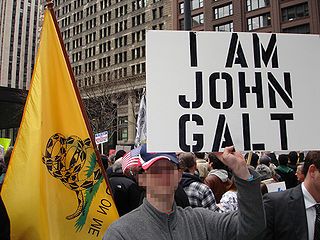Ayn Rand’s Philosophy and Sustainability

This overarching idea, i.e., “Let us ignore the needs of others,” was extremely well-received when it was introduced in the mid-20th Century. The Depression and WWII were behind us, and America was more than anxious for the economic boom that was to follow. And though this individualistic, anti-government construct fell out of favor in the few decades that followed, it’s back again now with a vengeance; in fact, our politicians who famously want to “shrink government to a size they can drown in a bathtub” have the vigorous support of almost exactly half of the U.S. electorate.
In particular, it rather looks like Ms. Rand’s dream is becoming reality. The top 85 people on Earth now have the same wealth as the bottom 3,500,000,000, and the regulations (environmental, financial, election campaigning, etc.) that would act to rein in powerful interests are systematically eroding.
I look at this through the lens of sustainability. What are the consequences of this trend continuing indefinitely into the future? That’s not an easy question to answer. We tend to think that a large and powerful middle class is an important ingredient in a successful democracy. Further, most of us recoil at the mass levels of poverty, disease, and starvation. Some of us even believe that we as a civilization need to curb the assault on our natural environment, and its consequences in the form of climate change, ocean acidification, lung disease, loss of bio diversity, water shortages, etc. even if that comes at the expense of putting the brakes on the dynamic urges of the world’s most talented and driven people and their descendants.
As always, I welcome comments.
